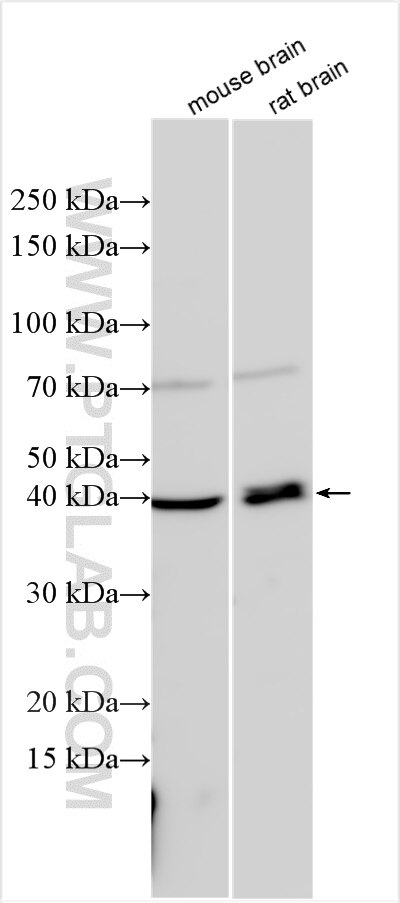Tested Applications
| Positive WB detected in | mouse brain tissue, rat brain tissue |
Recommended dilution
| Application | Dilution |
|---|---|
| Western Blot (WB) | WB : 1:500-1:2000 |
| It is recommended that this reagent should be titrated in each testing system to obtain optimal results. | |
| Sample-dependent, Check data in validation data gallery. | |
Product Information
31329-1-AP targets SLC10A4 in WB, ELISA applications and shows reactivity with Human, mouse, rat samples.
| Tested Reactivity | Human, mouse, rat |
| Host / Isotype | Rabbit / IgG |
| Class | Polyclonal |
| Type | Antibody |
| Immunogen | SLC10A4 fusion protein Ag34358 Predict reactive species |
| Full Name | solute carrier family 10 (sodium/bile acid cotransporter family), member 4 |
| Calculated Molecular Weight | 47 kDa |
| Observed Molecular Weight | 40 kDa |
| GenBank Accession Number | BC019066 |
| Gene Symbol | SLC10A4 |
| Gene ID (NCBI) | 201780 |
| RRID | AB_3669945 |
| Conjugate | Unconjugated |
| Form | Liquid |
| Purification Method | Antigen affinity Purification |
| UNIPROT ID | Q96EP9 |
| Storage Buffer | PBS with 0.02% sodium azide and 50% glycerol, pH 7.3. |
| Storage Conditions | Store at -20°C. Stable for one year after shipment. Aliquoting is unnecessary for -20oC storage. 20ul sizes contain 0.1% BSA. |
Background Information
SLC10A4 belongs to the solute carrier superfamily and is a protease-activated transporter involved in uptake of bile acid (PMID: 23589386). SLC10A4 is expressed with a high expression in brain and is a vesicular monoaminergic and cholinergic-associated transporter that is important for dopamine homeostasis and neuromodulation (PMID: 25176177).
Protocols
| Product Specific Protocols | |
|---|---|
| WB protocol for SLC10A4 antibody 31329-1-AP | Download protocol |
| Standard Protocols | |
|---|---|
| Click here to view our Standard Protocols |



